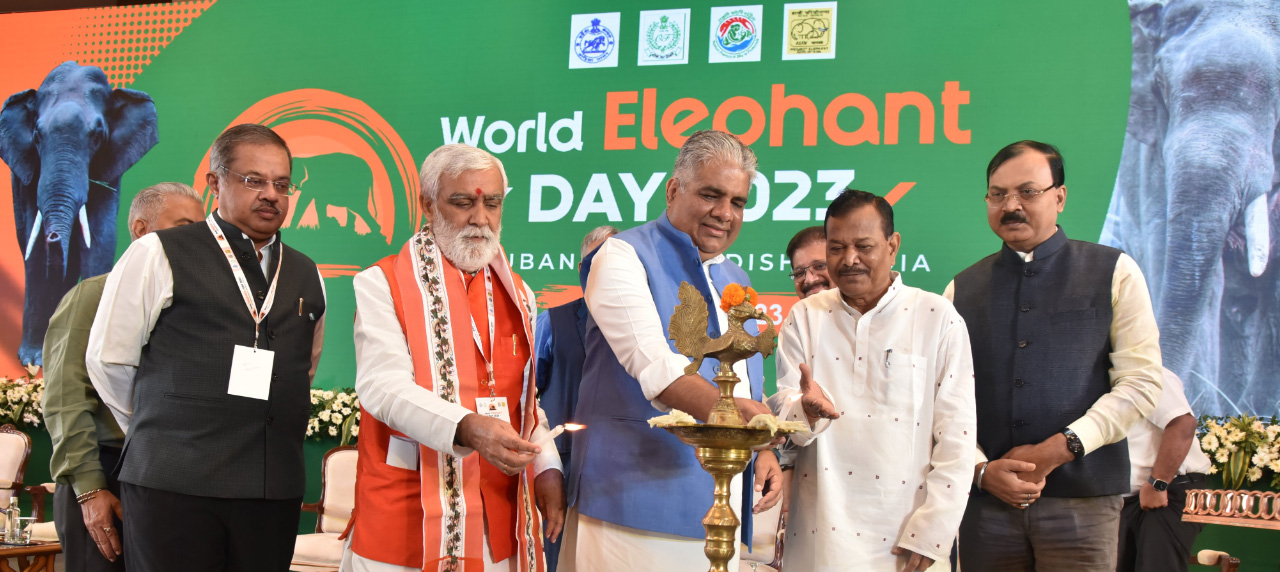Bhubaneswar: Union Environment, Forest and Climate Change Minister Bhupender Yadav has underscored the need to mitigate human-elephant conflict and ensure a safe passage for elephants.
He also emphasized creating more rescue and rehabilitation facilities for the elephant and building capacity of field staff and veterinarian.
The Union Minister said this while chairing the 19th Steering Committee Meeting of the Project Elephant here on Saturday which deliberated at length the current issues facing elephant conservation and management.
State Forest Minister Pradip Kumar Amat, ACS Forest, Environment and Climate Change, Satyabrata Sahu and the PCCF Wildlife, Sushil Kumar Popli graced the occasion.
As part of these efforts, about 110 critical stretches across the railway network in the country that pass through elephant habitats have been identified.
He said in these critical stretches, multipronged strategies are planned to minimize railway-related elephant collisions.
Shri Yadav said in these locations measures such as building underpasses, clearing vegetation along the tracks to increase visibility for the loco pilots to avoid collisions, provisioning ramps, and others will also be taken up. The Minister mentioned that the Ministry of Railways is contemplating to replicate the technology-based intrusion detection system along the tracks in Odisha and other States in the country.
Shri Yadav has emphasised on mainstreaming biodiversity conservation in India’s economic development to ensure ecological wellbeing and sustainability.
Addressing the gathering on the occasion of World elephant day here, he said with the largest population of wild Asian elephants, India is the mainstay for long-term conservation of the species.
He insisted that active participation with local communities is the key in steering elephant conservation to new heights. Shri Yadav said the Ministry is committed to reconciling human welfare and elephant conservation.
The Minister highlighted the concerted efforts taken by the Ministry of Environment, Forest and Climate Change (MoEFCC), Ministry of Railways, the State Forest Departments, and the National Institutions like the Wildlife Institute of India to address the critical issue of Railway-related elephant collisions.
Shri Yadav highlighted the novel initiative taken by the Ministry to map genotypes of all captive elephants in the country to prevent illegal trafficking of elephants.
The Minister said that for the first time ever, the Ministry has embarked on carrying out management effectiveness and evaluation of the Elephant Reserves across the country.
He said Four elephant reserves across the four elephant bearing regions of the country have been identified for piloting the process of management effectiveness evaluation for the elephant reserves. This will be a major step forward in standardizing and propagating best practices among the Elephant Reserves, he said.
The Minister further informed that the Elephant Reserve network in the country increased from 76,508 sq km to 80,777 sq km comprising 33 Elephant Reserves during the last two years.
Following the keynote address, Yadav interacted with the Gaj Saathi and other frontline staff who are in the forefront of managing human – elephant conflict.
As part of the world elephant day celebrations, the Minister released the report on the Elephant Corridors of India prepared by the Project Elephant. The report is an outcome of ground-validation of all the identified elephant corridors in India in coordination with the State Forest Departments of the elephant range states.
Shri Yadav also released the second version of the Atlas of Elephant Reserves of India, which is intended to provide basic information on all the 33 Elephant Reserves of India.
Among others, and senior officials from the State Forest Department and representatives from local communities were also present during the event.


